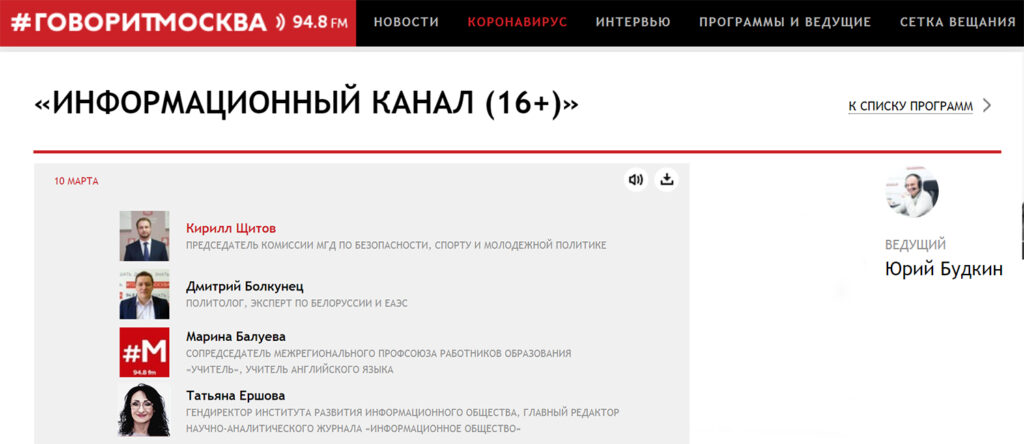On March 10, 2021, at 16:00, the Information Channel program went on the air on the Govorit Moskva radio. The host of the program, Yuri Budkin, referred to a recent publication of the Kommersant newspaper, which commented on concerns that some public services might become inaccessible without biometrics. The Russian Ministry of Digital Development, Communications and Mass Media proposes to intensify the collection of biometric data: it is planned to increase the number of entries in the Unified Biometric System (UBS) from the current 164 thousand to 70 million in two years, that is, every second citizen of Russia should be present in the system. According to some statements, the ministry wants to stimulate such growth with the help of administrative measures: if you fail to submit your biometric data, you do not get access to a number of public services.
The host asked several questions to Tatiana Ershova, General Director of the Institute of the Information Society and editor-in-chief of the scientific and analytical journal “Information Society”.
The first question: Why is it not possible to obtain the consent of citizens to collect their biometric data, why do they not run to leave their biometric casts?
T. Ershova suggested not to generalize, since many citizens do it voluntarily and even with pleasure, realizing that thanks to this they quickly receive government services in a remote mode, which is very important in our time. Others resist this, and they have their own arguments. Therefore, it is worth talking about those who understand the importance of biometrics for receiving services (government and not only) remotely, and about those who are afraid to transfer biometric information, realizing that the security of personal data is a problem that can be solved quite well, but failures may take place at the same time.
Second question: What can be done with a person’s biometric data?
T. Ershova noted that criminals can penetrate into various spheres of our life, and here this, too, cannot be completely avoided. However, biometric data, in her opinion, is still more reliably protected than a paper passport or other document that can be stolen or lost due to absent-mindedness. And biometric data will be stored in a reliable UBS, which is now acquiring the status of a state information system. Its reliable operation is ensured by Rostelecom in accordance with the requirements of the Federal Security Service and Federal Service for Technical and Export Control. Of course, it happens that the system may not recognize the voice or face of a person, or, conversely, recognize the voice or face of a completely different person, but such failures are extremely rare, therefore T. Ershova advocates the introduction of biometrics in Russia, especially since this is a global trend. People believe that it will make our life more convenient and safer.
The third question: But only 164 thousand of more than 140 million believe, and the officials want 70 million to come in two years. Will it be possible to force the people?
T. Ershova stressed that no one is forcibly driving anyone anywhere. Recently, Yuri Parfenov, director of the department for the implementation of strategic projects of the Ministry of Digital Development, said that the use of biometric identification technologies would not be mandatory to receive government services. Yes, the authorities are trying to stimulate the spread of biometric identification, and here she fully supports the efforts of the state, which is moving towards the digital development. Now the indicator is still very low, but this can be explained by the fact that people do not have enough information. They need to be educated, and the mass media should be involved in this process. They must explain to the citizens what problems there may be, how to solve them and what advantages it gives, and there are many more of them than problems.
Fourth question: What are these advantages? If my face or my fingers are in the system, will I be served faster?
T. Ershova is sure that it will be faster. And this is especially important for the provision of remote services, which is very topical for some regions, where some services are poorly or not at all available face-to-face.
Access to the recording of the program can be obtained on the website of the radio station “Govorit Moskva” (in Russian).
